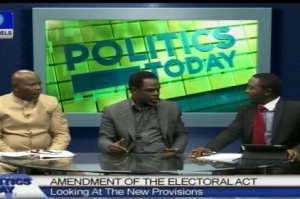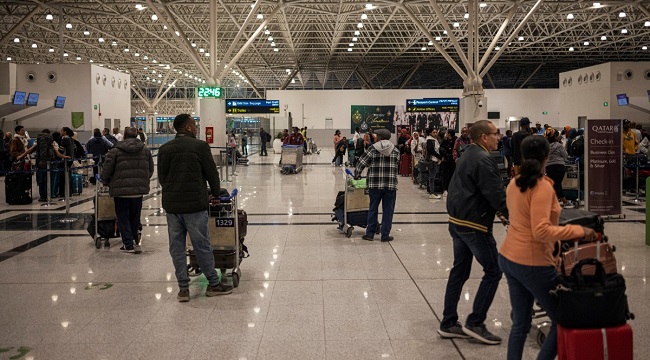
The July 6 edition of Politics Today on Channels Television focused on the new provisions of the amendment of the Electoral Act with guests from the legal and political sphere engaging in the conversation.
A legal practitioner, Wahab Shittu, believes that the only way to sanitize the electoral process was to review the laws and he lauded the Senate for making some of their decisions, which he said were steps in the right direction. Although, one of the amendments regarding the penalty for election result falsification, he said was too light.
A 12 month imprisonment with an option of a 500,000 Naira fine, he stated, was not deterrent enough as he argued that there should have been no option of a fine for such magnitude of crime which he said should have attracted a life jail.
A politician, Ken Okolugbo, also part of the conversation, noted that the Nigerian Senate has done very well with its approval of electronic voting. Although he admitted that the practise might not start immediately, he believed that it was a good foundation for a stronger electoral system.
He, however, differed with Mr Shittu as regards the penalty for election result falsification. The Political Scientist noted that Nigeria’s democracy was relatively young and as such would need to grow gradually.
He explained that the 12 months imprisonment was a good way to put all stakeholders in check, starting with the Youth Corpers who are usually deployed as electoral officers during elections. He believed that the fear of being jailed for 12 months was enough to stop them from engaging in sharp practices.
Burden of Proof At Election Tribunal
With the new amendments, the burden of proving irregularities during an election has been lifted off INEC.
Barrister Shittu believes that nothing has changed as the burden has always remained with the petitioner. He noted that it would have been better to have the Burden of Proof vested on the electoral commission because having conducted the election; they should be saddled with the responsibility of proofing that it was credible.
He also emphasized the need for an Election Offence Commission. He said that its non-inclusion in the Senates amendments was unfortunate.
Ken Okolugbo, who had been a victim of delay in electoral justice, agreed that INEC should have a major part of the job of proving the credibility of their elections. He cited his experience in court in the process of proving the irregularities of an election but ended up having his evidences nullified despite providing proofs sourced from the internet and seen to have been valid.
Shittu also disagreed on the power given to INEC to disqualify candidates. He argued that disqualification of candidates should be based only on them having flouted certain provisions of the constitution. He believes that too much power was being given to INEC to interfere in the internal democracy of political parties.
Okolugbo, however, expressed happiness at the provision. He believes the new development means that individuals can no longer be disqualified based on mere disagreements except a court says the person was not qualified.
Another new development was that the Senate also disagreed with INEC’s plan to conduct elections in one day and Barrister Shittu agreed with the Senate’s refusal to approve this in the amendment. He referred to their decision as being realistic as they knew the challenges associated with elections in Nigeria.
Okolugbo also aligned with the view of the Senate that the INEC does not have the capacity to conduct the presidential and governorship elections in one day.
Both guests however disagreed on the decision of the Senate not to legalise political debates. While Barrister Shittu opined that democracy was about the people and they should be given the opportunity to know the programmes of candidates in any election, Okolugbo believes that although the idea was good for democracy and so could be practised, it does not have to be included in the Electoral Act.




